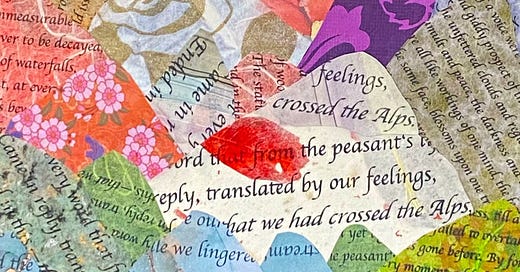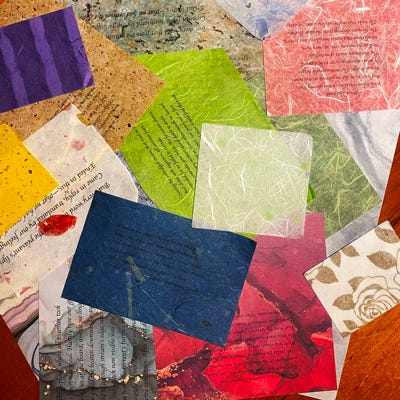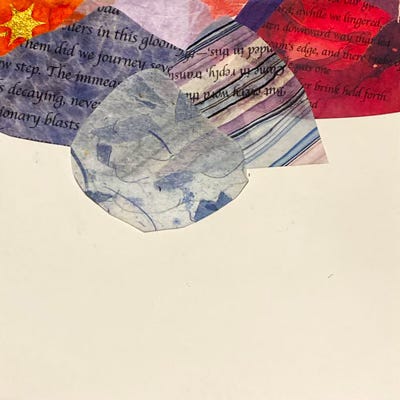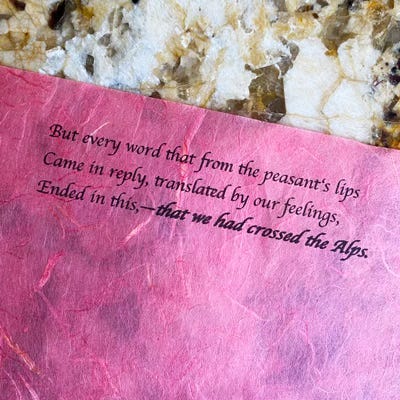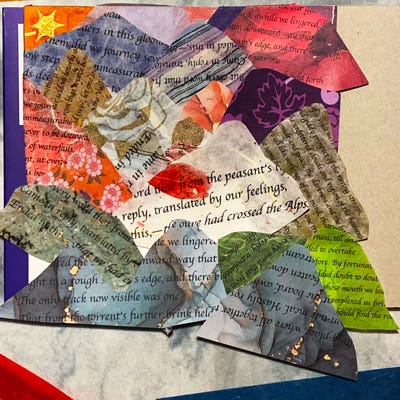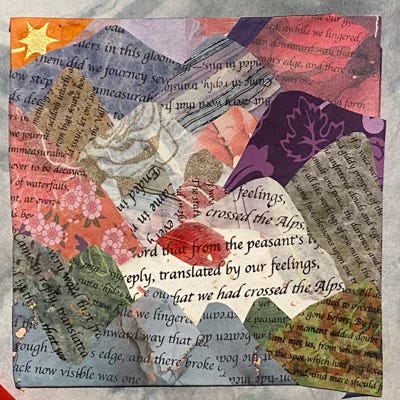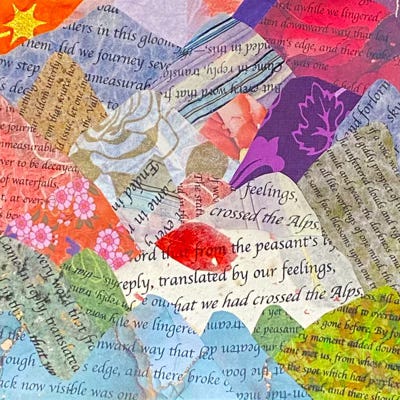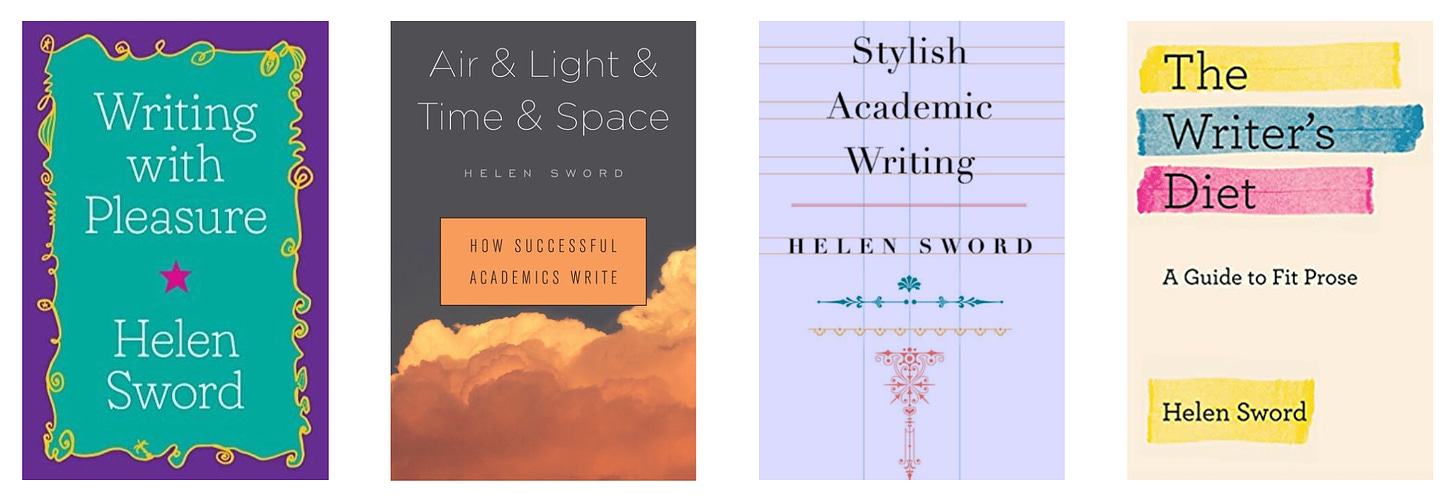Dear fellow writer,
I’m in the Swiss Alps this week, running my annual Mountain Rise writing retreat — and so, in honor of our spectacular setting, I decided to dust off this mountain-themed post from last year and to add a voiceover, in case you’d rather listen than read.
Enjoy!
The Simplon Pass
Many years ago, when I was a PhD student in comparative literature, I read Wordsworth’s masterpiece The Prelude, or Growth of a Poet’s Mind in a graduate seminar on Romantic poetry. Our professor pointed out the famous scene — sometimes published as a free-standing poem called “The Simplon Pass” — in which the young poet experiences a kind of sublime epiphany, a perception of divine Eternity in the ever-changing features of nature:
The unfettered clouds and region of the heavens,
Tumult and peace, the darkness and the light—
Were all like workings of one mind, the features
Of the same face, blossoms upon one tree,
Characters of the great Apocalypse,
The types and symbols of Eternity,
Of first and last, and midst, and without end.
But shortly before this revelation, Wordsworth narrates a scene of bitter disappointment, almost as though the former required the latter for its release. Having become separated from the rest of their group while crossing the Alps between Switzerland and Italy, the poet and his companion attempt to scale a lofty mountain, get hopelessly lost, and have to backtrack. Eventually they meet a local peasant who points out the route to their destination, which leads inexorably downward:
Loth to believe what we so grieved to hear,
For still we had hopes that pointed to the clouds,
We questioned him again, and yet again;
But every word that from the peasant's lips
Came in reply, translated by our feelings,
Ended in this,—that we had crossed the Alps.
What does it mean to cross the Alps unknowingly, missing out on that key moment of summiting? If you undergo a major life transition without noticing it, can you really count it as a milestone?
The mountains of the mind
I decided to reflect on this question by incorporating the words of Wordsworth’s poem into a paper collage. Unlike the young poet and his companion, I had no idea where I was headed. Rather than risking disappointment by embarking on a set path, I pulled out paper and scissors and glue and just start playing around: printing out the words of the poem on various sheets of paper, juxtaposing colors and textures, waiting for the moment when the collage itself would show me the way.
Opening myself to the wisdom of what Ursula K. Le Guin calls handmind, I started cutting and layering the paper, trusting my hands to tell me what to do. Before long, I noticed mountains forming:
My collage, I decided, would depict a mountain range criss-crossed by tracks of text. My placement of each “mountain” was dictated — no, that’s too strong a word, it was suggested — by some ineffable combination of color, pattern, texture, and text. Some of the words ended up upside down, or they slanted sideways like layers of sandstone shifted by ancient earthquakes:
I opted not to use the pink sheet on which I had printed out the poem’s key message in bolded, extra-italicized text, as it seemed a bit too in-your-face:
But I did make sure that the phrase “we had crossed the Alps” appears in a prominent position on the white mountain in the foreground of the collage:
And when my composition was all but complete, I capped that white mountain with another iteration of the same phrase, carefully centering the word feelings at the peak of the mountain and crossed the Alps just below:
All that remained for me then was to photograph the finished collage in better light and play around with the color mix in Photoshop, so that the finished artwork glows on your screen as though backlit by bright mountain light:
Have you ever fixed your eyes on a real or metaphorical mountain and, in doing so, lost sight of the path you’re actually walking on? Have you ever looked back on a transformational moment in your life and realized that you failed to notice it at the time because you were focusing on the wrong things? Like Wordsworth’s poem, my collage chronicles the challenges of looking, travelling, noticing, aspiring — the central themes of any writer’s life.
Coming down the mountain
If you’d like to try this writing-and-collage exercise for yourself, here are a few prompts to get you going:
Choose a short passage of text to work with: for example a poem or song lyric, a paragraph by a favorite author, or a piece of your own writing.
Copy or print the text out on sheets of colored or patterned paper, using different fonts and font sizes if you wish. As you do so, think about why you’ve chosen this particular text and what you can learn from attending to it closely.
Cut or tear the paper into scraps or shapes and start arranging them on a piece of cardboard — anything strong enough to remain stiff even when covered with wet glue. (I use square 15x15 cm pieces of canvas or card stock, but any size or shape will do). Think about what you’re doing and why as you make your decisions about composition, imagery, and form, but don’t overthink.
When you feel ready, start gluing the paper onto the cardboard using white glue or a glue stick. Don’t worry if you make mistakes or affix things in the “wrong place” (whatever that means!) Mistakes can lead to serendipitous flashes of insight.
To finish off, you can frame and display your collage, or glue it into a notebook, or photograph it and post it on Instagram — or not! In collage-making, the process matters as much as the product.
Don’t forget to write! Before, during, after the collage-making process — in your head if not on paper. Your handmind will tell you what to do.
If you enjoyed reading this post, please leave a comment below and share it with your friends — or at least blow me a heart.
Kia pai tō koutou rā (have a great day) – and keep on writing!
Helen
Write more, right now! Join me and fellow writers from 30+ countries in the WriteSPACE, the ultimate membership site for scholarly and professional writers who aim to lift their writing game. To try free for 30 days, click here and enter the discount code SNEAKPEEK.


